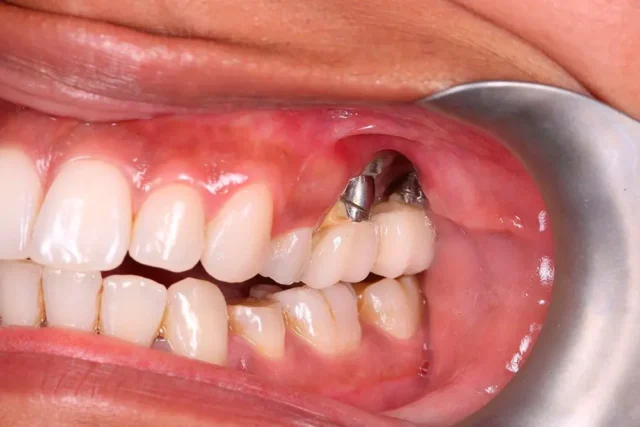Dental implants are often a fantastic solution for missing teeth. They offer a long-term, natural-looking option to restore your smile and improve your oral health. However, not every dental implant procedure goes as planned. “Bad dental implants” can lead to severe discomfort, health complications, and expensive corrective treatments. But what exactly happens when dental implants go wrong? And how can you avoid bad implant treament?
In this blog, we’ll break down the most common issues associated with bad implants, what to look out for, and how to ensure you get the right treatment.
What Are Bad Dental Implants?
Bad dental implants occur when the procedure fails or leads to complications. The goal of dental implants is to replace missing teeth by surgically placing a titanium post into the jawbone, which acts as the root of the missing tooth. A dental crown is then placed on top. When the implant process isn’t done correctly, it can fail or even damage the surrounding teeth and gums. Common symptoms of bad implant treatments include pain, swelling, loosening of the implant, or gum infections.
Signs of Bad Dental Implants
Recognizing bad implant treatment early can help prevent more severe issues. Here are some signs that you may have received poor treatment:
- Severe Pain: While some discomfort is normal after the procedure, extreme or prolonged pain may indicate that the implant wasn’t placed correctly.
- Implant Movement: A properly placed implant should feel sturdy. If your implant feels loose or unstable, this could be a sign of bone loss or incorrect placement.
- Infection: Redness, swelling, or pus around the implant site can be signs of infection. This is a major cause of bad implant treatment and can lead to further complications.
- Bone Loss: A failed implant may cause bone loss around the site. This can weaken your jaw and lead to other dental issues.
- Gum Recession: Gum tissue can recede if the implant is not positioned well, leading to visible metal or an unnatural appearance.
If you experience any of these signs, it’s essential to visit a dental professional immediately.
Common Causes of Bad Dental Implants
Several factors can lead to bad dental implants, including poor implant placement technique, insufficient bone structure, or improper aftercare. Here are the most common causes:
1. Inexperienced Dental Professionals
The skill and experience of your dental surgeon play a huge role in the success of dental implants. Bad implant treatments are more likely to occur if the procedure is done by someone who lacks the necessary experience.
2. Inadequate Bone Structure
For dental implants to be successful, there needs to be sufficient bone in the jaw to support the implant. If you have thin or weak bone tissue, the implant may not integrate properly, leading to failure.
3. Improper Placement
The placement of the implant is critical. A bad angle, improper depth, or failure to align the implant correctly can lead to complications, including gum recession, bone loss, or an implant that feels loose or painful.
4. Infection or Poor Oral Hygiene
Even with a perfectly placed implant, poor oral hygiene can lead to infections, known as peri-implantitis. This condition can cause gum and bone inflammation, which can result in implant failure if not treated quickly.
5. Allergic Reaction to Titanium
Though rare, some patients may be allergic to titanium, the metal used in most dental implants. This can cause inflammation, discomfort, or even implant rejection.
What to Do If You Have Bad Dental Implants
If you suspect that you have bad dental implants, it’s essential to act quickly to avoid further complications. Here are the steps you should take:
- Consult with a Specialist: Get a second opinion from a qualified dental implant specialist. They can help you assess the damage and recommend corrective treatments.
- Get X-rays and CT Scans: Advanced imaging can reveal whether the implant has failed or if bone loss is occurring. These images will help determine the next steps.
- Follow Up on Treatments: If your implant has failed, you may need to have it removed, and in some cases, bone grafting will be required before another implant can be placed.
How to Avoid Bad Dental Implants
Bad implant treatment can be avoided with the right planning and care. Here’s how to ensure you get the best possible treatment:
- Choose an Experienced Surgeon: Do your research and choose a dental professional with extensive experience in placing dental implants. Read reviews and check for certifications.
- Check for Bone Density: Ensure that your dentist evaluates your bone density before placing the implant. If you lack sufficient bone, a bone graft may be necessary before implantation.
- Maintain Proper Oral Hygiene: Brush and floss regularly, and attend follow-up appointments with your dentist to monitor the implant’s progress.
- Avoid Smoking: Smoking can negatively impact the healing process and increase the risk of infection or implant failure.
Conclusion: Ensuring a Successful Dental Implant Experience
Dental implants are an excellent way to restore your smile, but bad implant treatment can cause significant problems. By recognizing the signs of failure, choosing an experienced surgeon, and maintaining proper oral hygiene, you can avoid the complications associated with bad implant treaments. Always consult a trusted dental professional and ensure that all necessary evaluations and precautions are taken before undergoing this procedure.
If you’re considering dental implants or have concerns about your current treatment, don’t hesitate to reach out to our clinic for a free consultation. We prioritize patient safety and satisfaction, ensuring you get the best dental care possible.
FAQs
1. What are the most common reasons for bad dental implants?
Well, Bad dental implants can result from several factors including poor surgical technique, insufficient bone density, improper implant placement, infections, and neglecting post-surgery care. Inexperienced dental professionals or poor patient oral hygiene can also increase the risk of implant failure.
2. How can I tell if my dental implant is failing?
Some signs of a failing dental implant include severe pain, excessive swelling, bleeding, gum recession, implant loosening, or pus around the implant site. Any discomfort that lasts for weeks after the procedure may indicate a problem, and it’s important to contact your dentist immediately.
3. Can a bad dental implant be fixed?
Yes, a bad dental implant can often be fixed. In some cases, the implant may need to be removed and replaced after proper healing. Bone grafting might also be necessary if there’s bone loss. It’s crucial to consult with a dental specialist to evaluate the best course of action.
4. How can I avoid bad dental implants?
Choosing a qualified and experienced dental professional is one of the best ways to avoid bad implant treatment. Make sure your dentist evaluates your bone structure, and follow all aftercare instructions. Good oral hygiene, including regular brushing and flossing, can prevent infection and implant failure.
5. How long does it take to recover from a bad dental implant?
Recovery time depends on the severity of the complication and the treatment required. If bone grafting or implant removal is necessary, the healing process could take several months. However, each case is unique, and your dentist will provide a personalized recovery timeline.
6. Are bad dental implants more common in older patients?
While age itself isn’t necessarily a risk factor, older patients may have more bone density issues or underlying health conditions that could affect the success of dental implants. This is why it’s critical to assess bone health before proceeding with the treatment.
7. Can smoking cause bad dental implants?
Yes, smoking is a known risk factor for implant failure. It can reduce blood flow to the gums, delaying the healing process and increasing the chances of infection. Smokers are more likely to experience complications with their implants compared to non-smokers.
8. What should I do if I experience pain after getting dental implants?
Mild discomfort is normal after receiving dental implants, but if the pain is severe or persists for more than a week, it’s important to contact your dentist. This could be a sign of infection or improper placement, both of which require immediate attention.
9. What happens if bone loss occurs around a dental implant?
Bone loss around a dental implant can weaken its stability, leading to implant failure. In such cases, bone grafting may be required to rebuild the bone and provide a stable foundation for a new implant.
10. How much does it cost to fix a bad dental implant?
The cost of fixing a bad dental implant depends on the extent of the damage, whether additional procedures like bone grafting are needed, and the dental professional’s fees. Corrective treatments can range from a few hundred to several thousand dollars.




